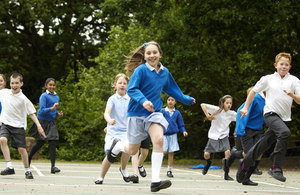PHE’s 2014 Child Health Profiles published
PHE’s Child Health Profiles give a snapshot of children and young people’s health for each local authority in England in a readable format.

School children in the playground
The Child Health Profiles 2014, published today (Wednesday 19 March 2014) by Public Health England (PHE), presents a picture of child health and wellbeing for each local authority in England using 32 key health indicators which help local organisations work in partnership to improve health in their local area.
They contain data on a wide range of issues about and affecting child health, from levels of childhood obesity, MMR immunisation rates, teenage pregnancy and underage drinking, to hospital admissions, educational performance and youth crime.
Local government and health services can use these as a valuable tool to help understand the needs of their community, and assist in improving the health and wellbeing of children and young people and reduce health inequalities.
Dr Helen Duncan, Programme Director at PHE’s Child and Maternal Health Intelligence Network, said:
These profiles bring together valuable information from numerous sources of data to help us understand more about children and young people’s health in England.
We hope that these resources prove as popular with those working with and for children across the system as they have done in previous years, and help local authorities and health and wellbeing boards with prioritisation and strategic planning in their area. It will also help commissioners learn from best practice across the country to help drive improvement locally.
Professor Kevin Fenton, National Director of Health and Wellbeing at PHE, said:
The Local Authority Child Health Profiles 2014 enable local authorities to identify where they are doing well as well as where they might improve in terms of child health, helping them to set priorities locally. PHE are committed to improving child health in the local community and are working on a range of programmes to support local areas to develop a joint strategic needs assessment.
There are simple things we can all do every day with our kids that are likely to support children’s wellbeing. That’s things like walking to school with them (and talking to them on the way), making sure they get a healthy breakfast, making sure they are active for the recommended 60 minutes per day and switching some of that screen time into physical activity.
PHE’s Child and Maternal (ChiMat) Health Intelligence Network’s website also provides interactive maps and charts for users to create their own views of the data, and links to further supporting and relevant products.
This is an annual update and the first time PHE is responsible for publishing these statistics which were previously published by the Department of Health.